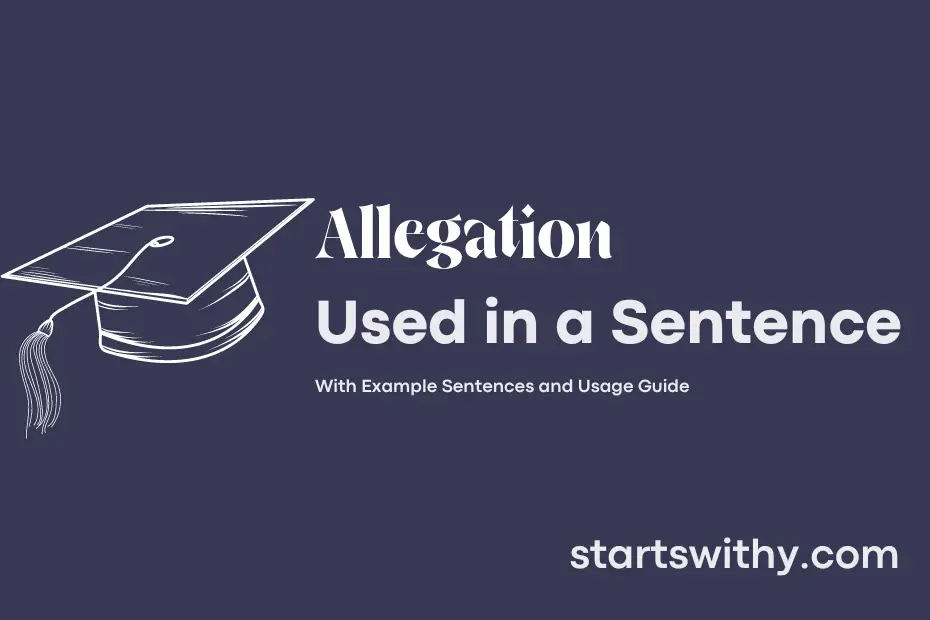Have you ever heard the term “allegation” and wondered what it exactly means? An allegation is a claim or assertion that someone has done something wrong, typically without any concrete proof provided at the time of the accusation.
In legal terms, an allegation is a statement made by a party in a case, which has not yet been proven to be true. It’s essentially an unproven assertion that forms the basis of a case or dispute.
7 Examples Of Allegation Used In a Sentence For Kids
- The teacher said the allegation was not true.
- My friend made an allegation that I took his pencil.
- We should always be honest and not make false allegations.
- The principal will investigate the allegation of cheating.
- It is important to listen carefully before making an allegation.
- We should not spread rumors or make baseless allegations.
- If you have a problem, talk to a teacher instead of making an allegation.
14 Sentences with Allegation Examples
- The professor made an allegation that some students had cheated on the exam.
- The student denied the allegation of plagiarism made against him by the faculty.
- There was an allegation of nepotism in the selection process for the student council.
- The university committee investigated the allegation of discrimination against international students.
- The student union president faced an allegation of embezzling funds meant for campus events.
- The dean issued a statement addressing the allegation of favoritism in grading practices.
- The student was suspended pending investigation into the allegation of campus vandalism.
- The faculty member filed a formal allegation of harassment against a senior staff member.
- The student government launched an inquiry into the allegation of unfair election practices.
- The campus newspaper reported on the allegation of research misconduct by a renowned professor.
- The disciplinary committee will review the allegation of hazing within a fraternity on campus.
- The student council called a meeting to address the allegation of misuse of funds for club activities.
- The university administration sent out a warning regarding the allegation of drug use at campus parties.
- The diversity and inclusion committee was formed to address the allegation of systemic discrimination in admissions.
How To Use Allegation in Sentences?
To use Allegation in a sentence, start by identifying the accusation or claim that you want to mention. Insert the word Allegation in your sentence to indicate that the statement is being made without providing proof of its accuracy.
For example, “The allegation of fraud against the company caused its stock prices to plummet.” In this sentence, the word allegation is used to convey the accusation of fraud without affirming its truthfulness.
Similarly, “She made a serious allegation about his behavior at the meeting.” Here, the word allegation is used to express the claim made by “she” regarding “his” behavior without confirming its validity.
It’s important to remember that when using Allegation in a sentence, you are highlighting a statement that has been put forward as true by someone, but is without concrete evidence to support it. This word is often utilized in legal contexts or when discussing accusations that have not been proven.
In summary, incorporating Allegation into your sentences adds a layer of caution, emphasizing that the statement being made is an accusation or claim that may or may not be substantiated.
Conclusion
In conclusion, allegations are formal accusations or statements made against someone without proof or evidence. These allegations can be damaging to a person’s reputation, career, or personal life. It is important for individuals to be cautious when making or spreading allegations, as they can have serious consequences for both the accuser and the accused.
When faced with allegations, it is crucial to respond calmly, gather evidence to disprove the claims, and seek legal guidance if necessary. It is also important for society to maintain a fair and just system that adequately investigates and addresses allegations to prevent false accusations and protect the rights of all individuals involved.



